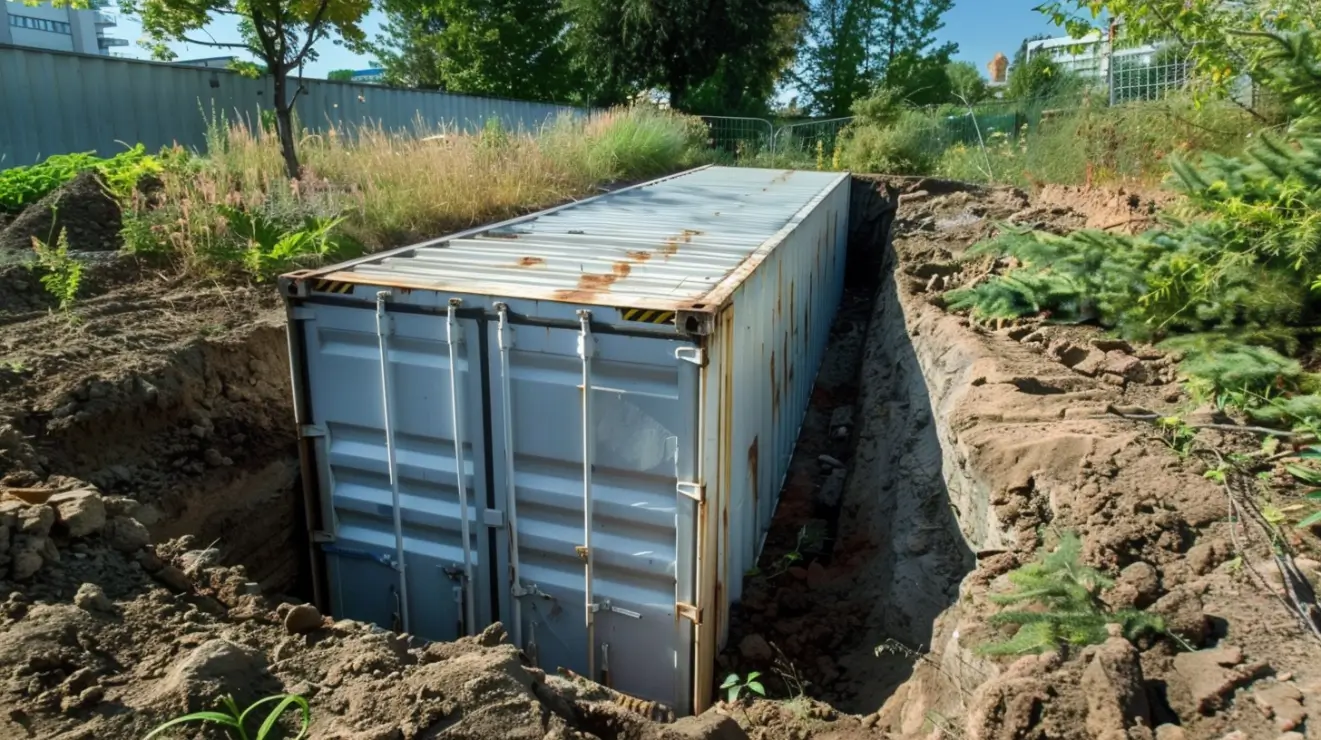Shipping containers can be seen everywhere nowadays, from construction sites to back gardens, school campuses, and hospital car parks. They’re a versatile, durable, and flexible way to expand your storage space for personal or business needs.
What are storage containers?
Rectangular steel containers can be called shipping containers or storage containers, based on their two primary uses. Most containers start out as portable units for shipping cargo. They’re designed to stand up to travel and rough weather at sea.
Shipping containers come in a range of standard sizes, most commonly 20 or 40 feet long, with locks and bolts to protect them from theft.
Once they “retire” from sea shipping, storage containers have a range of uses on land. Because they’re so portable, they are useful for temporary storage on construction sites and private land. They can also be converted into long-term storage units, offices, or workshops.
Benefits of using a shipping container for storage
There are many reasons why shipping containers for storage are such a popular choice. Besides being durable, secure and weather resistant, they also provide a versatile, transportable, and cost effective storage solution.
Durable and secure
Shipping containers are made of corten steel, which is extra-strong and weather-resistant. They can cope with high winds, rain, and extreme hot and cold.
Their steel frame also protects them from casual theft. Many storage containers come with built-in locks, but you can add padlocks and lock boxes for additional security.
Cost-effective
It’s cheaper to use a storage container than to build a new storage facility or shed – regardless of whether you rent or buy a container. In some locations, storage containers don’t need the same planning permission as permanent structures.
Avoiding the need for planning permission can reduce your costs even more. However, you should always check local regulations to see whether you need planning permission for a shipping container.
Weather-proof and water-resistant
When containers are on board cargo ships, they’re exposed to waves, rain, and high winds. Their watertight design means that the cargo doesn’t get damaged during the journey.
That’s why shipping containers are so useful if you need outdoor storage space. You can extend the life of a storage container even more by regularly treating the steel with rust-resistant paint.
Portable
Storage containers are easy to move, place, and stack. They can be transported by truck, crane, or train, as well as on board cargo ships.
Transporting shipping containers is especially useful if you only need storage for a short space of time, or if you’re planning to move it from place to place. For example, construction companies can pick up containers and move them between worksites. Or, if you use a storage container for personal storage at your home, you’ll be able to take it with you when you move house.
Large storage capacity
Storage containers start at 10 feet long, but can be up to 45 feet or more in length. That’s a lot of storage space! You can even find high cube shipping containers which have extra-tall ceilings – ideal for storing vehicles and large machinery.
Customisable
You can convert shipping containers for specialist storage, or even use them for offices and temporary accommodation. With their simple steel frames, it’s easy to add windows, doors, and extra shelving to your container. You can also wire in electricity, plumb in water pipes, or add insulation, heating, and ventilation systems to suit different climates.
Eco-friendly
When you choose to buy a shipping container over a traditional storage building, you reduce the use of new materials. You’re also saving the container from landfill, which reduces your environmental impact even more.
Minimal maintenance
Your storage container will need minimal maintenance. Because the steel is so strong, you just need to check for wear and tear periodically. If you use anti-rust paint and watertight door seals, then the container will last even longer.
Versatile applications
There really is a storage container out there for everyone! Whether you want to store work tools, agricultural vehicles, office furniture, building materials, business products, or personal belongings, a storage container is a durable way to keep your items safe.
Quick setup
If you need urgent or short-term storage, shipping containers are one of the easiest options available. To install your storage container, you just place it on suitable foundations and it’s ready for use almost immediately.
Challenges of using a shipping container for storage
There are a few situations where a standard shipping container might not fit your storage needs. However, most of these issues can be resolved by adapting a shipping container with extra amenities.
Lack of climate control
Standard shipping containers aren’t insulated because the temperature doesn’t matter for most cargo. If the temperature outside fluctuates, then condensation can start to build up in the container, changing the humidity levels.
Items like electronic equipment, fabrics, paper archives, and food can be affected by changes in humidity and temperature. Fortunately, there are steps you can take to manage this.
For minor condensation, you can use damp sticks to remove humidity from inside the container. If you plan to use the container to store fragile items, then you might also invest in insulation, temperature controls, or ventilation.
Want to know more about protecting your shipping container from condensation?
Discover the common causes of condensation and explore effective solutions to keep your shipping container dry, well-ventilated, and in optimal condition for storing your valuable goods.
Don’t let moisture damage your valuable items – find solutions to prevent condensation today!
Read guideVentilation issues
Containers are built to be airtight and watertight to protect them during sea freight. However, this lack of air circulation can contribute to damp, musty odours, or mould inside the container. The easiest way to fix the issue is by installing air vents to circulate fresh air through the container.
Possible permit requirements
Shipping containers are easy to install, but you’ll still need to comply with local zoning laws and building codes. For example, you might need a permit to place the container on your property in some areas. Contact your local authority to find out the rules where you are.
Corrosion and maintenance
Shipping containers are highly resistant to rust. However, they can still deteriorate over time – especially if you live somewhere damp, such as a coastal area or somewhere that gets a lot of rain. You can extend the container’s life by repainting it regularly and patching any rust spots that appear.
Looking for tips on maintaining your shipping container?
Staying proactive with maintenance is key to avoiding costly repairs and extending your container’s life. Learn all about essential upkeep practices, how to spot potential issues, and common repairs to keep your container in top shape.
Check out our comprehensive guide for valuable tips on shipping container upkeep and repairs.
Learn moreAccessibility
Most containers have doors built in at one or both ends. However, these doors are big and can be difficult to handle, making them adequate for most uses. If you have an extra-long container or want easier access, then you can modify the container with extra personnel doors or windows to the side of your container.
What can I store in a shipping container?
Shipping containers are useful for both business and personal storage. They’re durable, capacious, and endlessly versatile.
Shipping containers for self-storage
Homeowners and renters can use shipping containers for easy self-storage. All you need is space next to your home, or on a piece of land, to place the container.
Household items
Because storage containers can hold large items, they’re ideal for storing:
- Furniture including tables, chairs, sofas, beds, and mattresses.
- Appliances such as washing machines, dryers, and refrigerators when not in use.
- Seasonal items such as winter clothes and equipment for sports, gardening, or camping.
- Textiles such as spare clothing, linens, and blankets. Make sure that these items are sealed away from damp.
- Books and documents such as personal archives, photographs, and paperwork. However, you’ll need a dehumidifier or moisture-absorbing packets to protect against any risk of dampness.
Vehicles
Don’t have enough garage space? A storage container gives you a secure, sheltered space for additional cars, motorcycles, ATVs, or bicycles. Small boats and personal watercraft, such as kayaks and stand-up paddleboards, will easily fit inside larger containers.
Outdoor and sports equipment
Gear for outdoor hobbies can take up a lot of space. Camping tents and sleeping bags can be safely packed away in a storage container. With an extra padlock or two, you can also store valuable sports equipment such as golf clubs, surfboards and kayaks.
Storage containers are also useful for gardening equipment such as lawnmowers, leaf blowers, wheelbarrows, and other tools.
Hobby supplies
Every crafter has their stash – whether it’s yarn, clay, scrapbook supplies, woodworking tools, or something else. Storage containers give you plenty of secure space where you can organise materials into boxes and shelves. You can also store valuable collectibles if needed, just make sure that the container is adapted for climate control and minimal humidity.
Renovation and moving storage
Shipping containers for moving can make the process of renovations, downsizing, or house moves much easier. You can store heavy items and boxes right next to your property until you’re ready to take them in again.
Shipping containers for business storage
Storage containers are equally popular with all kinds of businesses, from city-centre offices to construction crews.
Inventory and stock storage
Storage containers are an easy way to store temporary excess inventory for brick-and-mortar stores, especially during peak seasons. If you want to give your customers access to bulk pricing, you can use a storage container to hold bulk goods until they’re needed. They’re also useful if you run an e-commerce business from home and need extra space to hold stock before shipping it out.
Construction equipment and materials
Construction companies have to store valuable tools and machinery, as well as building materials. Storage containers are secure and sheltered, which protects your investments from damage and theft. You can also use storage containers as temporary offices, break rooms, and record storage.
Need a shipping container for your construction site?
Check out our range of range of site container offices to find the perfect solution today!
View containersAgricultural and farming supplies
Extra-tall storage containers give you a secure, sheltered place to keep tractors, ploughs, and other large equipment. The standard sizes are also useful for holding animal feed, fertiliser, and other supplies. You can even store harvested crops in containers on a temporary basis before they’re sold.
Office supplies and furniture
Businesses with office spaces often need more storage than expected. As well as documents that have to be archived for legal reasons, they may have excess stationery, office furniture, or electronics. Some businesses will also have equipment that only gets used occasionally, such as event equipment and marketing materials. Storage containers can be adapted for secure, damp-proof storage nearby your office building with a minimal footprint.
Workshops and manufacturing
You can modify shipping containers with plumbing, electricity, lighting and ventilation so that they’re suitable for workshop use. Then you can store tools and supplies alongside your extra workspace. This is a great choice for artisans, mechanics, and craftsmen, as well as small manufacturers. You can always stack containers for extra space as the business grows.
Specialty storage
Shipping containers can be modified for almost any type of specialty storage. For example, refrigerated containers (called “reefers”) are ideal for storing perishable produce, seafood, and flowers. Other containers are pre-modified to create stable, locked storage for hazardous materials such as chemicals, paints, and flammable liquids.
Shipping and logistics support
Containers are literally built for logistics. They’re secure, strong, and portable – ideal for storing and shifting goods. They can also be used as temporary distribution points where goods can be picked up and dropped off by suppliers and buyers.
What not to store in a shipping container
Storage containers are extremely versatile, but – without the right modifications – they have limits.
Perishable food items and hazardous materials should only be stored in containers which have been adapted for the purpose. Items which are vulnerable to temperature and humidity changes, such as electronics, fine art, and paper documents, should be kept in containers with ventilation and temperature control.
Containers can be converted to use as homes, holiday lets, animal pens, and even plant nurseries. However, they must be fully modified with air circulation, doors, windows, plumbing, and electricity.
Last of all, you should never store illegal items or substances in a container under any circumstances.
How to choose the right shipping container for your storage needs
There is a huge range of shipping container sizes, shapes, and types on the market.
To choose yours, start by thinking about size. Standard containers range from 10 feet to 40 feet long. You need a size which fits on your property while being large enough for whatever you plan to store in it. In some cases, you’ll need a container that has extra height.
Next, take a look at your budget. New and “one-trip” containers (which have only been used once) are the most expensive, but they’ll be in great shape. Used containers are far cheaper, but you’ll need to check them for wear, rust, and dents. However, even if they have a little wear, these containers should still be completely watertight and lockable.
How to use a shipping container for storage
There are countless ways to use your shipping container for storage, but incorporating a few key additions will help you optimise the space and protect your goods. By following these guidelines, you can ensure your container is secure, durable, and perfectly suited to meet your specific storage needs.
Customise the interior
Adding wall-mounted shelves will add to the storage space and convenience of your container. As well as increasing the vertical space, it’s also much easier to view and organise your items when they’re laid out on shelves. For large or irregular-shaped items, such as kayaks or construction materials, you could look into cargo racks instead.
Need shelves for your shipping container?
Check out our range of shelving and racking to find the perfect solution for your needs!
Buy ShelvingInstall climate controls and ventilation
If you’re planning to store electronics, furniture, fabrics, or anything else temperature-sensitive, then you’ll need to modify the container with insulation and ventilation. Choose a refrigerated container for any perishable goods such as food or flowers.
Pack and protect your items
A shipping container in good condition should be watertight. However, if your container doesn’t have insulation or ventilation, then humidity can still build up over time. It’s a good idea to install a dehumidifier or scatter moisture absorbers like silica gel packs through the container.
To further protect your stored valuables, try storing items in sealed, waterproof plastic bins to safeguard against moisture and other potential damage. You can also add padding or bubble wrap to protect against breaks and damage.
Enhance security
Storage containers are only useful if they’re secure. Invest in heavy-duty locks for the container doors. You could also think about extra measures, such as security cameras or a sign-in system, especially if the container is on a site that’s accessed by lots of people.
The bottom line
Shipping containers for storage are incredibly versatile, secure, and long-lasting, making them an ideal solution for a variety of needs. This durability is why they have gained popularity for both home storage and a wide range of business applications.
With just a few thoughtful modifications, these containers can be adapted to store almost anything, from household items and seasonal decorations to equipment and inventory for businesses. Their adaptability and resilience make them a practical choice for anyone looking to maximise their storage options.
Looking for a completely custom solution?
We have a wide range of base containers that can be customised to your needs, however we
realise
that
sometimes you need something completely ‘Outside the box’.
Contact us and one of our experts will be in touch to help design the container of your
dreams





